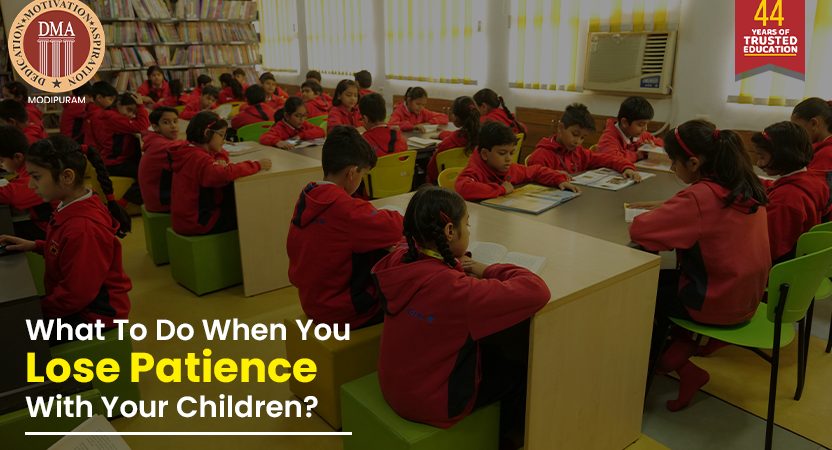Parenting is undoubtedly a rewarding and fulfilling journey, but let’s face it – there are moments when patience wears thin. From handling a child’s sudden emotional outburst in public to mediating disputes between siblings – there are endless situations that will test your patience. In most cases, you can lose it. We at Dayawati Modi Academy, one of the top schools in Meerut, understand that such experiences can be emotionally draining and frustrating, but having said that, trust us, these are just normal parts of a healthy parenting journey.
Although you cannot entirely stop getting angry, frustrated, or losing patience while raising kids, especially toddlers and teenagers, you can take steps to control impulsive reactions. It will make your parenting journey much easier and more joyous than before. To help parents succeed in this pursuit, we have handpicked some practical, powerful, and easy-to-follow tips to prevent you from losing patience frequently. So, let’s quickly explore all the tips discussed below and implement them at the earliest.
-
Take a Break
Yes! One of the best ways to prevent situations from getting out of hand is by retracting from heated situations. We at Dayawati Modi Academy believe taking a step back, pausing, and reflecting on the situation calmly is always the best solution. It gives enough time and space for emotional recalibration, preventing impulsive reactions.
When you take a break instead of reacting aggressively with your kids, you can see the event differently by reflecting on emotions and considering alternative responses. It is an effective and proactive strategy meant to promote self-awareness and emotional regulation among parents.
-
Practice Deep Breathing
It can appear as an unconventional tip, but it is one of the most effective and potent ones. Deep breathing is a mighty tool that can help you navigate moments of intense frustration. The technique focuses on taking slow, conscious breaths that activate your body’s relaxation response. It instantly provides a sense of relief by calming your nervous system while helping you regain composure and mental clarity.
The best part about deep breathing is it can be performed discreetly in various settings, enabling parents to manage their stress on the spot. We recommend incorporating this method into your suite of coping strategies to elevate your emotional resilience and effectively respond to challenging situations with greater clarity, understanding, and patience.
-
Reflect on Your Triggers
Every individual has some triggers that make them react instead of responding in different situations. For example, if you react aggressively when your kid repeats misbehavior, refuses to study, doesn’t eat healthy, stays disorganized, etc., you must step back and reflect on your triggers. Identifying specific triggers can give you greater insights into your emotional responses.
View it as a powerful self-awareness tool designed to help people address underlying issues more effectively. Once you know the root cause of your triggers, you can work on it, set realistic expectations, and develop proactive strategies to better handle similar situations in the future. Reflecting on your triggers will help foster personal growth and equip you with all the tools needed to navigate tough waters with greater resilience and patience.
-
Set Realistic Expectations
Every parent wants their children to behave responsibly, act maturely, and think clearly. But isn’t this too much to ask for children of all age groups? Parents must understand that not all kids have the same level of understanding, knowledge, temperament, etc. They aren’t even at the same developmental stage as others.
Many parents experience frustration when they see their kids engaging in developmentally appropriate activities that don’t necessarily align with parent’s overly optimistic standards. The only way to overcome such experiences is by acknowledging and accepting the natural variability in children’s behaviors. A change in perspective is needed to start setting realistic expectations that foster healthier, balanced, and more harmonious parent-child relationships.
-
Communicate Openly
Last but definitely not least is something we at Dayawati Modi Academy, one of the best school in Meerut, always advise the parents to do – engage in open communication with your kids. Trust us, open communication between parents and children always resolves tough situations calmly by enabling both parties to express emotions in an age-appropriate and calm manner. It creates a safe environment driven by trust and understanding – an environment where parents and kids can share true feelings, making both understand each other’s viewpoints.
So, next time you find yourself losing your patience with your kids, try embracing open communication to transform challenging moments into opportunities for better connection and collaborative growth. This approach strengthens parent-child relationships while developing their emotional intelligence in a supported and nurturing environment.
Conclusion
Parents are always on a rollercoaster ride and have little idea what awaits next. In such situations, certain activities and kids’ behaviors can trigger impatience, leading to frustration, rage, anxiety, and a cocktail of other emotions. While such events can guilt-trip you into believing you’re not a good parent, it is rarely the case. Losing patience is a normal part of raising kids; it only requires better ways of handling tough situations. If you’re a parent trying to handle challenging situations in a better way instead of losing patience easily, implement the tips discussed above continuously for visible improvements.

